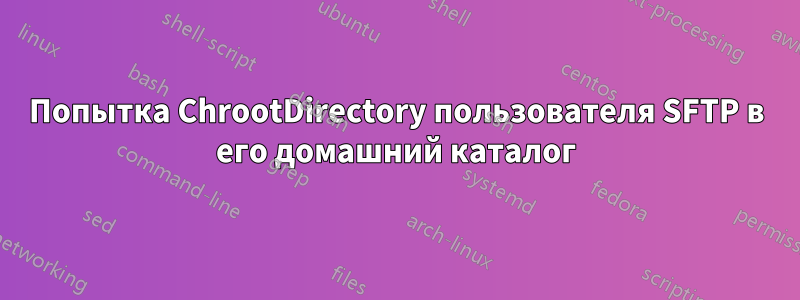
Я следовал нескольким примерам того, как это сделать, все они заканчиваются sshd_configизменением
Subsystem sftp internal-sftp
Match User chubbyninja
ChrootDirectory %h
AllowTCPForwarding no
X11Forwarding no
ForceCommand /usr/lib/openssh/sftp-server
Когда я это делаю, я затем, sshd -tчтобы убедиться, что нет никаких ошибок,service sshd restart
после перезапуска я пробую SFTP (с помощью Filezilla), но я продолжаю получать
Response: fzSftp started
Command: open "[email protected]" 22
Command: Pass: ********************
Error: Network error: Software caused connection abort
Error: Could not connect to server
Если я верну конфигурацию в исходное состояние, я смогу нормально использовать SFTP, но затем я смогу просматривать любой каталог. Где мне нужны пользователи только в их домашнем каталоге
В моей конфигурации по умолчанию есть такая строка:
Subsystem sftp /usr/lib/openssh/sftp-server
Что я и естьзаменас указанными выше данными.
У меня есть доступ к этой машине только по SSH, хотя у меня есть права root.
ОБНОВЛЯТЬ После того, как я последовал совету sam_pan_mariusz, похоже, дело пошло дальше, но теперь я получаю
Response: fzSftp started
Command: open "[email protected]" 22
Error: Network error: Connection refused
Error: Could not connect to server
ОБНОВЛЕНИЕ 2
Я также последовал совету Froggiz и изменил свою конфигурацию следующим образом:
Subsystem sftp internal-sftp -u 0007 -f AUTH -l VERBOSE
Match Group chubbyninja
ChrootDirectory /home/chubbyninja
ForceCommand internal-sftp -u 0007
AllowTcpForwarding no
GatewayPorts no
X11Forwarding no
но я получаю оригиналПрограммное обеспечение прерывает соединение
Я отслеживаю /var/syslog, но ничего не отображается, чтобы указать причину этой ошибки.
ОБНОВЛЕНИЕ 3 - Добавлен sshd_config
# Package generated configuration file
# See the sshd_config(5) manpage for details
# What ports, IPs and protocols we listen for
Port 22
# Use these options to restrict which interfaces/protocols sshd will bind to
#ListenAddress ::
#ListenAddress 0.0.0.0
Protocol 2
# HostKeys for protocol version 2
HostKey /etc/ssh/ssh_host_rsa_key
HostKey /etc/ssh/ssh_host_dsa_key
HostKey /etc/ssh/ssh_host_ecdsa_key
HostKey /etc/ssh/ssh_host_ed25519_key
#Privilege Separation is turned on for security
UsePrivilegeSeparation yes
# Lifetime and size of ephemeral version 1 server key
KeyRegenerationInterval 3600
ServerKeyBits 1024
# Logging
SyslogFacility AUTH
LogLevel INFO
# Authentication:
LoginGraceTime 120
#PermitRootLogin without-password
PermitRootLogin yes
StrictModes yes
RSAAuthentication yes
PubkeyAuthentication yes
#AuthorizedKeysFile %h/.ssh/authorized_keys
# Don't read the user's ~/.rhosts and ~/.shosts files
IgnoreRhosts yes
# For this to work you will also need host keys in /etc/ssh_known_hosts
RhostsRSAAuthentication no
# similar for protocol version 2
HostbasedAuthentication no
# Uncomment if you don't trust ~/.ssh/known_hosts for RhostsRSAAuthentication
#IgnoreUserKnownHosts yes
# To enable empty passwords, change to yes (NOT RECOMMENDED)
PermitEmptyPasswords no
# Change to yes to enable challenge-response passwords (beware issues with
# some PAM modules and threads)
ChallengeResponseAuthentication no
# Change to no to disable tunnelled clear text passwords
PasswordAuthentication yes
# Kerberos options
#KerberosAuthentication no
#KerberosGetAFSToken no
#KerberosOrLocalPasswd yes
#KerberosTicketCleanup yes
# GSSAPI options
#GSSAPIAuthentication no
#GSSAPICleanupCredentials yes
X11Forwarding yes
X11DisplayOffset 10
PrintMotd no
PrintLastLog yes
TCPKeepAlive yes
#UseLogin no
#MaxStartups 10:30:60
#Banner /etc/issue.net
# Allow client to pass locale environment variables
AcceptEnv LANG LC_*
Subsystem sftp internal-sftp -u 0007 -f AUTH -l VERBOSE
# Set this to 'yes' to enable PAM authentication, account processing,
# and session processing. If this is enabled, PAM authentication will
# be allowed through the ChallengeResponseAuthentication and
# PasswordAuthentication. Depending on your PAM configuration,
# PAM authentication via ChallengeResponseAuthentication may bypass
# the setting of "PermitRootLogin without-password".
# If you just want the PAM account and session checks to run without
# PAM authentication, then enable this but set PasswordAuthentication
# and ChallengeResponseAuthentication to 'no'.
UsePAM yes
Match Group chubbyninja
ChrootDirectory /home/chubbyninja
AllowTCPForwarding no
X11Forwarding no
GatewayPorts no
ForceCommand internal-sftp -u 0007
решение1
вот как я настроил свой sftp для конкретного пользователя
1] создать пользователя
adduser {USER}
2] отредактировать /etc/ssh/sshd_config
PasswordAuthentication yes
Subsystem sftp
internal-sftp -u 0007 -f AUTH -l VERBOSE
Match Group {USER}
ChrootDirectory {FOLDER}
ForceCommand internal-sftp -u 0007
AllowTcpForwarding no
GatewayPorts no
X11Forwarding no
3] установить права для пользователя
chmod -R 777 {FOLDER}
4] перезапустить ssh
service ssh restart
замените {USER} на вашего пользователя, а {FOLDER} на вашу папку, и это должно сработать! ;)
Можете ли вы выложить полную конфигурацию SSH?
решение2
Я не совсем понимаю часть вопроса «замена», но... при chroot-е в SSH,ForceCommandдолжно ссылаться на внутреннее имя подсистемы. В вашем случае вся строка должна выглядеть так: ForceCommand sftp.
Если вы хотите использовать путь к исполняемому файлу вChroot, вам придется подготовить правильный chroot-каталог (содержащий библиотеки, на которые ссылается исполняемый файл, конфигурации и т. д.).
Соответствующие строки из моей рабочей конфигурации:
Subsystem sftp /usr/lib/openssh/sftp-server
Match User testuser1
ChrootDirectory /one/dir/path/
ForceCommand internal-sftp


